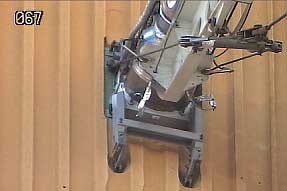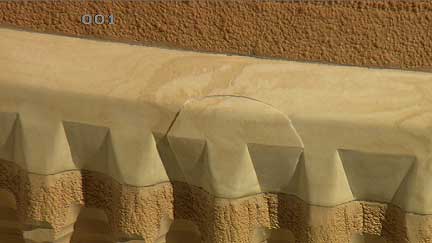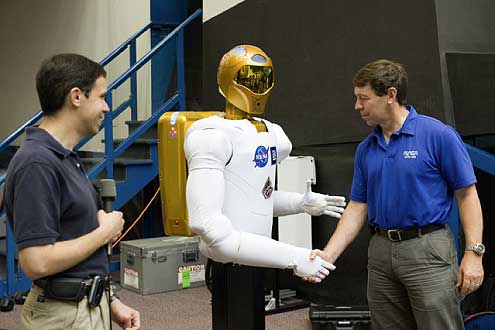
Ground umbilical carrier plate
Details will be discussed during a 1 p.m. news conference with Mike Moses, Space Shuttle Program launch integration manager and mission management team chairman, and Mike Leinbach, shuttle launch director.
Technicians will retrieve the ground umbilical carrier plate at Launch Pad 39A and begin a close look at it over the weekend after a leak in the apparatus prompted a scrub of Friday's launch attempt for space shuttle Discovery. Mike Leinbach, shuttle launch director, said the liftoff was postponed until no earlier than November 30 so engineers could have time to consider the problem and inspect the GUCP more closely.

Crack in external tank foam
Mike Moses, chair of the Mission Management Team, said the crack did not develop until after the launch attempt was called off. However, he said the team will analyze the crack carefully.
The leak, detected early Friday morning while the shuttle's external fuel tank was being loaded, was at the Ground Umbilical Carrier Plate, or GUCP, an attachment point between the external tank and a 17-inch pipe that carries gaseous hydrogen safely away from Discovery to the flare stack, where it is burned off.
The 11-day STS-133 mission will deliver the Permanent Multipurpose Module (PMM) to the station. The PMM, which was converted from the multi-purpose logistics module Leonardo, will provide additional storage for the station crew and experiments may be conducted inside it, such as fluid physics, materials science, biology and biotechnology.

Robonaut 2, the Next Generation Dexterous Robot JSC2010-E-112701 (4 Aug. 2010) — NASA astronaut Michael Barratt, STS-133 mission specialist, shakes hands with Robonaut 2 (R2) during media day in the Space Vehicle Mock-up Facility at NASA's Johnson Space Center. R2 is the first humanoid robot to travel to space and the first U.S.-built robot to visit the International Space Station. R2 will stay on the space station indefinitely to allow engineers on the ground to learn more about how humanoid robots fare in microgravity. Ron Diftler, NASA Robonaut project manager, is at left.
Commander Steve Lindsey leads the veteran crew, which includes Pilot Eric Boe and Mission Specialists Alvin Drew, Tim Kopra, Michael Barratt and Nicole Stott.
STS-133 is the final shuttle mission planned for 2010, Discovery's 39th flight and the 35th shuttle mission to the station.

